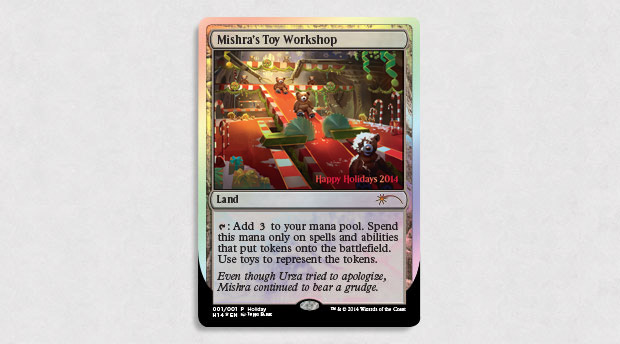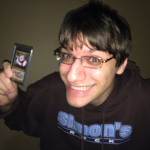The Magic event of the year is wrapping up in Nice, France early this Sunday morning. The entire week has been an incredible celebration of the greatest players in the world playing the greatest game in the world. Whether you enjoy watching true masters play some very unique formats in the World Championship. the team spirit and national pride of the World Magic Cup, or just seeing a little more of the global culture that's evolved around Magic, these events have something for everyone.
Between the stories of the players and teams as they battled for pride, prizes, and titles, the crazy formats, and absurd topdecks, it's been an awesome week to be a Magic player, and Team Gathering Magic is ready to highlight exactly why. These are our picks of the week.
Picks of the Week: November 30, 2014
 |
Adam Styborski is Content Manager for Gathering Magic, writer of Command Tower for magicthegathering.com, text coverage reporter at Grand Prix and Pro Tours for Wizards, a Pauper Cube developer, and known curmudgeon.You can find him sharing things on Twitter as @the_stybs. |
Teamsters United
While I’m admittedly biased given my current status of working the finals of it, the adventures of Worlds Week is one of the few that truly captures the spirit of Magic. Craig Gibson, longtime photographer for the Pro Tour, has been snapping hundreds of photos throughout the show.
What I wanted to call out wasn’t necessarily the numerous photos of World Championship contenders (A group well-snapped at other premier events.) and delicious food (Well, actually I’m down with that.) but of the photos of all 72 teams that arrived for the World Magic Cup. The spirit, pride, and excitement each team brings to the unique tournament is amazing, and the photos are the best justice anyone off site can get for experiencing it.
Or you can just watch through the entire montage of team photos in the handy video below:
The Space Between
My experience with Magic has been one that’s fairly easy. I have plenty of events to travel to, generally far more than I can attend and often several happening at the same time. I have friends everywhere in the United States, more or less, so anywhere I am I don’t have far to go to game.
Understanding the unique and sometimes difficult situations others face in their homelands is, as always, an eye-opening experience for me. Nudges, big and small, from players the world over has helped shaped my thoughts on the game. The challenges completely unknown help inform why Wizards does some of the things they do, and why some players react so differently from others.
I may not ultimately change my mind, but having just a bit of insight helps me make better sense of the broader Magic world.
Vintage Boosting
Do you want to experience your own slice of a World Championship? Do you like Draft or Cube? The staff at the World Championship broke down every pack of Vintage Masters that was drafted on the first day of competition.
You know what to do from here.
Whacking Day
I love silver-bordered cards. While it’s hard to find a group willing to engage in a little shenanigans, those that do can create experiences unlike any other in Magic. It’s been over ten years since Unhinged graced store shelves, so the best opportunity we have for new fun comes from the annual release of the holiday card by Wizards.
This year’s is a particularly spicy and fun choice.

A. E. Marling walked through building decks around these treat cards, and why they’re as much as fun as you imagine. While they are tricky to find at times, picking up the one that seems the most entertaining and having a deck to show it off is an easy way to add a layer of fun for everyone.
 |
Heather Dawn Lafferty is the Community Manager for Gathering Magic, collector and creator of the 20 Tweets series, and resident Angel.Speaking of tweets, you can tweet her with your thoughts regarding Gathering Magic content, Magic, or Nintendo at @Revisedangel. |
It turns out that Angels have lots of passions. You might have figured out last week that Heather enjoys some video games from time to time. This weekend she's attending the Game Awards in Las Vegas; a celebration of all the most excellent things that gaming had to offer this year. From Hearthstone to Dragon Age to Shovel Night, our Angel is getting as much gaming as she can stand, and will be back with a vengeance next week.
The MAN #Nintendo #TheGameAwards pic.twitter.com/cK85OqKMeu
— Heather Dawn (@Revisedangel) December 6, 2014
Being in the crowd and seeing reactions to King's Quest was everything! #TheGameAwards
— Heather Dawn (@Revisedangel) December 6, 2014
SHOVEL KNIGHT LIKE A BOSS #TheGameAwards pic.twitter.com/DPPuOe2mhl
— Heather Dawn (@Revisedangel) December 6, 2014
Ppl r freaking out over ZELDA #TheGameAwards pic.twitter.com/H5KjvRmIgE
— Heather Dawn (@Revisedangel) December 6, 2014
 |
Alex Ullman is Associate Editor for Gathering Magic, a renowned Pauper (cube and Constructed) player, and member of the victorious 2009 Magic Online Community Cup team.You can find him on Twitter as @nerdtothecore. |
Worlds Week is one of the most wondrous weeks of the year. I hope it goes without saying that you should go and devour as much of the coverage as you can. Watch all the replays and worm your way through the written coverage. Paul Jordan wasn’t lying when he said this:
Video coverage gets all the glory but text coverage is in a completely different league from even just 2 years ago. #mtgchamp
— paul jordan (@magicPJ) December 3, 2014
I would also carve out the time required to review any match covered on video by Simon Goertzen. The Pro Tour Champion joined the main broadcast team for coverage of the first two days of the World Championships and absolutely killed it in the booth. He has a smooth and direct manner for communicating the nuances of Magic combined with the poise of someone who has been doing this far longer than his actual tenure. The moment that stands above the others for me is when Goertzen made an error in a card name, allowed his co-commentator to provide analysis, and then picked up the conversation by correcting himself without laughing it off or insulting himself. The amount of discipline it takes to do this on the fly is high on the scale. I watch a lot of baseball and Goertzen is far closer to Vin Scully than he is to this guy and that is to be commended.
Worlds 2014 Report - Paulo Vitor Damo da Rosa
Writing a tournament report is hard. Once an art form it has been relegated to something expected of professional players and those who win major events. While there have been some stellar reports in recent years very few writers are able to pen them as consistently well as Paulo Vitor Damo da Rosa. Paulo is incredibly honest and it shows in his writing. The past few years have been less kind to the Hall of Famer and he takes ownership over this, listing out his mistakes.
It is far harder to come out and announce to the world “I sucked” than declare “I won.” Paulo, sadly, has had to do much more of the former recently and yet it doesn’t detract from quality of his reports. That is enviable.
The report itself is wonderful. PVDDR weaves a tale starting with his first Worlds over a decade ago. He goes on to discuss the change in the tournament format and how he missed the event and lost the “Paulo Slot.” Now he’s back at Worlds and you can almost hear the sorrow as he comes to realize how he has squandered a chance by lack of adequate preparation.
One of the best in the world and he falls into the same pitfalls as so many others. It’s humanizing.
There is emotion here, but it’s disappointment with himself, not anger and the performance (or some alleged shadiness - read the article for the full scoop).
Paulo is one of the best in the game both at playing and writing. Read him, and you too can be one step closer to Luis Scott-Vargas:
My favorite Magic writer is still @PVDDR, and I enjoyed his Worlds report (even if Worlds itself didn't go well). http://t.co/ZFLKGO89W5
— Luis Scott-Vargas (@lsv) December 5, 2014
From the Sideboard: Kramer Control Wins a PTQ - Hugh Kramer
I’ve been playing Magic for a very long time. I played in high school even though very few people there stuck with the game. I also moved between social circles easily without being popular in any of them. In one circle I met Hugh. We were always friendly - acquaintances who hung out with the same people but never each other. I’d see him around and chat, but we had very little in common.
Fast forward ten years and I move back to Brooklyn and head to my friendly local game store. Who do I see but Hugh? After we say hello I utter “I didn’t know you played this game.” He hadn’t back then but picked it up in recent years. Since then we’ve battled a few times and he’s always come out on top.
Hugh is what I’d call a pillar of the Brooklyn Magic community. He helped organize the very popular Team Draft League and is always willing to help other people improve. This season he’s become a PTQ End Boss, making multiple Top 8s. Seeing him finally win one is something awesome.
Hugh’s report is short and to the point. He admits mistakes and punts but talks about the zone. Unlike PVDDR he does not pore over every important detail, yet nothing feels missing.
It’s a good thing Hugh is making the Pro Tour, though, because his career as a cake decorator looks to be over before it started.
Magic: The Gathering, That Old Nerd Favorite, is the New Poker - Hunter R. Slaton
Hunter is one of the first people from the draft league Hugh helped start to make the Pro Tour this past summer. Hunter is also a professional writer. He told me that he had pitched this story and I was immediately eager to read it and jealous of the gig.
Hunter’s piece is a great article to show someone when they ask you “what is that game?” especially if you are a grinder on the PTQ (soon to be PPTQ) circuit. It is honest about what the game is while trying to break down common misperceptions about the gatherings of mages we attend. Slaton doesn’t hide the fantasy elements but uses quotes from Patrick Chapin and Brock Procker to ground our hobby in something far more mathy and poker like than robes and pointy hats.
Hunter is writing a Magic article for mass consumption and doesn’t dumb it down. He anthropomorphizes the game into a self-effacing intelligent twenty-something and I can get behind that. He makes our culture sound fun, relatable, and welcoming. And those are all Good Things.
 |
Carlos Gutierrez is an Associate Editor for Gathering Magic, an engineer-in-training, and a Commander and Pauper enthusiast. By day, he works as a STEM educator, but he spends his weekends hitting all his land drops and trying new board games, puzzles, and video games.
You can find all of him sharing Commander craziness, baked goods on Twitter, and complaints about graduate school at @cag5383. |
Wasteland Conundrum – AJ Sacher
I love old formats. Not so much playing them, necessarily, since I’m pretty sure my head would explode just a few turns in. Instead, I love watching the intricacies of the format shift and evolve over time. Cards fall in and out of favor. People learn and forget cute tricks and interactions. Metagame cycles are broken up by new and exciting powerhouses.
Nowhere is this subtle evolution more interesting or dramatic than it is in Legacy, and this week AJ Sacher captures why. Not only that, but in doing so, he showcases important lessons in the role of different types of cards in deckbuildling and gameplay. The focus of his attention? Wasteland.
One of the most iconic cards in Legacy, second only to Brainstorm, perhaps. Wasteland has been a defining aspect of the format for about as long as I can remember. And yet, it’s been falling out of favor. 27 copies in the Top 8 at Grand Prix Strasbourg. 10 in the Top 8 at Grand Prix Paris. 7 At Grand Prix New Jersey. Sure, it’s just a few events, but it’s not hard to see that Wasteland has been on a huge downswing in recent months, if not years.
AJ Sacher may just change that with this veritable dissertation on the card. Why it’s awesome. How and when to best utilize it. Corner cases. You name it. It starts with in-depth analysis about why his Blue-Red Delver list is different from everyone else’s (hint: it’s the Wastelands), and evolves into an incredibly educational discussion of the depth of one of Legacy’s defining cards.
Gro History and Current Legacy – Carsten Kotter
Speaking of old formats, I love history. American history. World history. You name it. I think it’s fascinating to see how different events are connected and to see how the consequences of small actions play out on a larger scale. The fact that I’m terrible at history because I can’t remember names or dates is beside the point.
As far as Magic goes, I’m great at remembering deck lists and quirky card choices. I love seeing how cards come to prominence and fade back into obscurity; how strategies are created and evolve over time. That’s why I love articles that delve into the history behind the decks of today; that’s why I loved Adam Barnello’s History of Legacy; that’s why I loved Carsten Kotter’s breakdown of cantrip-fueled Gro decks. Carsten starts at the very beginning, with Alan Comer and Quirion Dryad, and steps through no less than ten decklists as he time travels from Turbo Xerox up to Brian Braun-Duin’s win in Grand Prix New Jersey with Jeskai Stoneblade.
The lessons of the past are there for the taking. It never hurts to revisit the fundamentals. Our decks are only as good as they are because of the breadth and depth of experiential knowledge we have to draw upon, and sometimes it’s good to pay homage to the original masters.
Steady Progress – Ant Tessitore
I’m not much of a Vorthos, but Ant Tessitore and Mike Linnemann may change that yet. This week Ant put together an awesome story about Alcanus, the Vedalken scientist. Maybe it’s because I’m working on an engineering degree. Maybe it’s because of the crazy nights I’ve put in on my own research projects. Alcanus and I, we’re on the same wavelength.
It’s because of that that I understand why he found the Glistening Oil so fascinating. I understand his need to understand what it was; what is was capable of. I understand his descent into obsession; into madness. I’ve been there. I know. It’s the little details that get me; the changes in his handwriting, the twisting of his passions and strengths against him. I’ve been Alcanus. Maybe I can learn from him too.
You caught me, Ant. This story is great. The deck lists are awesome. I can’t wait to see more of this kind of evocative, short form storytelling. There’s even a poll at the end of his article so you can ask for more. Which you should. I know I did.
Alibi
It’s not often that I find a game that my family likes as much as I do. We all get along reasonably well, but you have to understand that, whether it’s television, movies, books, games, or anything else, we all have really different interests and tastes, so it’s not often that we find something that works for all of us. For a few years now, Alibi has been the game that we all understand, all enjoy, and all want to win.
Why? It’s simple to understand, but there’s enough depth and variance to keep things interesting from game to game. Imagine a combination of Hearts and Clue, and you’ve got the gist of it. It’s a classic Whodunnit game where you solve the crime by passing cards, making sets, and asking questions.
Every turn, each player gets to ask their opponents questions about their knowledge of the case. The problem is that everyone gets to hear these questions, so it’s important to track what you’re revealing. After each pass of questions, you pass some of your cards to your opponents.
Throughout the game, you can play sets of cards that you’ve collected to guarantee points now, but at the cost of revealing information and giving yourself fewer cards to pass. That’s a big deal, as the number of cards you’re required to pass increases with every turn cycle. So you try to protect your unique pieces of information, mislead everyone else, and race to solve the mystery before your secrets are forcibly revealed.






















